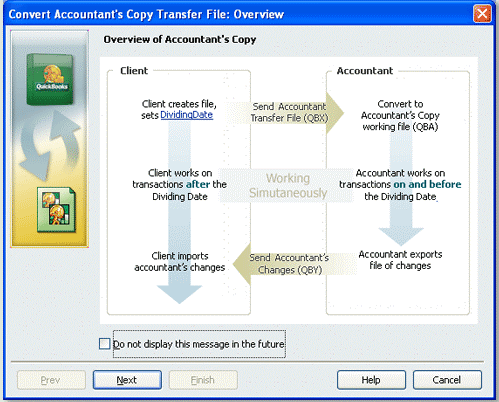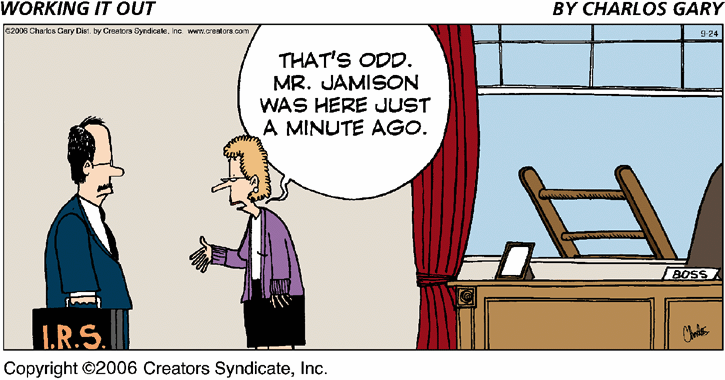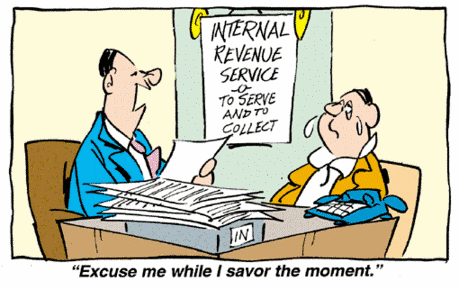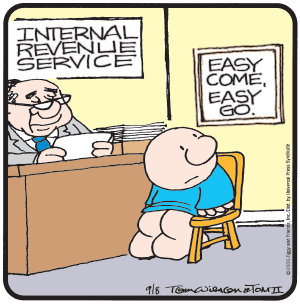Accountant's Review With QB 2007
I haven't received my copies of the 2007 QuickBooks programs yet. I'm assuming they will be here some time this coming week. I have been looking over some of the announcements and descriptions of new features. One in particular caught my attention.
Since we have most of our clients using various versions of QuickBooks, we normally have them submit their data via the Accountant's Review function. As anyone who has worked with these special files can attest, it is frustrating to have to deal with the restrictions the program places on the files the clients send. It's also frustrating when clients make changes to data in time periods for which we've already finished the tax returns.
According to this description from Intuit, we will be able to do more with the files clients send us.
Exchange, review and adjust a range of transactions in the client's prior period accounting using the All New Accountant's Copy and they can continue working in their ongoing QuickBooks files. After your receive the Accountant's Copy from the client you can:
Add, edit and delete most transactions in the prior period
Add new transactions
Add and edit the chart of accounts
Add new customers, vendors and items
While you work in the Accountant's Copy clients can continue to work in their QuickBooks files but are restricted from making changes to the periods you are working on. Send your adjustments back to clients, and then they can review and automatically integrate them into their files.
Since these improvements will only be effective for the 2007 and future programs, it will become increasingly frustrating to have to continue working with client files created using earlier versions. For some reason, many of our clients are still using the QB 2002 and 2004 programs.

Labels: QB
Changes in Charitable Deductions Hidden in New Tax Law: Effects on Deductions for Charitable Gift-Giving by Individual Donors – Good recap of the new changes, from the latest issue of Intuit ProConnection Newsletter. Includes a link to a doc file that you can use to notify clients of these changes.
Some interesting article in the most recent issue of Accounting Today.
Choosing the right structure for a surviving spouse's IRA
2006 legislation enhances many attributes of IRAs
Despite critics, IRS moves on with private collections – This article includes a link to a sample letter you can use if you are among the “lucky” 12,500 taxpayers chosen to work with the new free-lancers, but prefer to stick with the good old IRS (“the devil you know, etc”).
Wrangle over tax gap fix continues – Includes a few good quotes about how it is impossible to accurately measure the true tax gap, a controversial point I have been trying to make for decades.
Study: Grants better than tuition tax breaks – File this earth-shattering news under “Duh.” Tax free 100% reimbursements are always better than any kind of tax credits or deductions.
Report: IRS snafu cost over $300M – Nothing new here either. The computer expertise of the geniuses at IRS continues to confound, amaze and cost us taxpayers hundreds of millions of dollars in waste. The big difference between how this kind of screw-up is handled with government employees is that those responsible will be promoted; while a private industry company would fire such incompetents.
Calif. Real Estate Withholding
Q-1:
Subject: Re: How long to wait for a refund?
Kerry,Nice to know, but for me it came about 18 months too late. No longer live in CA and sold my former home and had the state withhold a massive wad of my money even though I knew I would owe no taxes and they had to give it all back eventually.Irksome since the IRS didn't require any withholding at time of sale (my profits fit the primary residence sale exemption - but for out of staters CA still requires withholding).
A-1:
Your email brought up a couple of issues that obviously need clarifying.
California has always had an exemption from the withholding for those sellers who qualify for the Federal Section 121 exclusion. All you needed to do was file Form 593-C with the closing agent (title company) and indicate that you meet the Section 121 rules and no tax would be withheld. Your personal professional tax advisor should have told you about that before you closed your sale if your Realtor or the escrow agent didn't. This information is also readily available on the FTB's website.
Hopefully, you have already filed the 540-NR and recovered the money, which became an interest free loan that you provided for the State of California.
A little history lesson. The California withholding requirement for real estate sales by non-residents was instigated a number of years after a similar law was passed by the Feds requiring a withholding of 10% of the gross sales price from sales of real estate by non-residents of the USA. The state withholding rate was officially established as one-third the federal rate; thus the 3.333%.
The concept and motivation for both the Federal and State withholding requirements were the same; to snatch some money up front in an attempt to "motivate" non-resident sellers to "voluntarily" file income tax returns reporting those sales. Non-resident sellers were always required to file those tax returns long before the withholding rules were established. However, when there was no money snatched ahead of time, there was less incentive for sellers to file the required tax returns. It was always the intent to withhold more money that would actually be due so that sellers would have to file to recover the overpayments.
I hope this helps you better understand the situation.
Thanks for writing.
Kerry Kerstetter
Q-2:
First off, please ignore the subject line. I just hit "reply" to an earlier line of conversation we had rather than retype your email and forgot to change the subject line.Anyway, I did go over the withholding requirement with my tax preparer (and he's good, not some H&R Block fly by nighter). For some reason having to do with the fact that we only qualified for a partial 151 deduction due to not meeting the 2of5 year requirement but having unforseen circumstances, the CA forms would not let us avoid the withholding. It was odd I recall. I think possibly the CA forms said we had to be residing there presently to qualify but if we qualify under 151 with IRS, then we don't have to pay taxes. It was a bit of a catch 22. I could probably dig out the paperwork and find exactly what the issue was if you're curious.Oh, thanks for the history lesson. I'm interested in history, but for the tax code I usually say we should just scrap it all and start from the beginning. I think if a flat tax ever passed it would only take about 20 years of "exceptions" to get us right back here again.
A-2:
While it's water under the bridge for you now, I did just check Form 593-C and its instructions and it does appear that you could have claimed a full exemption from the withholding by checking the YES box next to Question 1 in part II. The instructions specifically mention the fact that sellers may not have lived there a full two years if selling due to employment, health or unforeseen circumstances and the home would still qualify for the Section 121 tax free exclusion.
Your tax advisor may have interpreted this differently or there may have been another relevant factor involved that would have disqualified you from the exemption.
It's obviously too late to matter for you; but I hope others can learn from this.
Kerry Kerstetter
Corporate Privacy
Q:
Subject: Thanks for you website!Dear Mr. Kerstetter,Thank you for the information you provide on your website...I found it very helpful in making decisions for the corporation I am forming.In the "Choosing a Corporate Name" section you touch on the privacy factor a corporation offers. I will be working from home to start and move into an office as company begins to grow. Can I use my home address or should I use a mail service to collect mail for the corporation until it has an office?Thanks!
A:
If you are trying to remain anonymous as the owner of the corp, you should consider using a PO box or other mail forwarding service.
If that kind of privacy isn't critical, using your home address for your corp would be fine and is done quite frequently.
As always, you should be working with a team of professional tax and legal advisors to make sure you do everything properly for your goals and unique circumstances. There are far too many ways to screw things up by trying to analyze and handle everything on your own.
Good luck.
Kerry Kerstetter
Change in Calif. Real Estate Withholding
Spidell has this announcement of an upcoming (as of 1/1/07) and very welcome change in the rules for tax withholding from real estate sales.
“Allows sellers of real estate to elect to withhold tax in an amount not less than the maximum tax rate multiplied by the reportable gain (9.3% for personal income tax purposes and 8.84% for corporations) instead of 3-1/3% of the sales price of the real property.”
Allowing the tax to be based on the actual gain rather than the gross sales price should more closely match the withheld amount to the actual tax. This was long overdue.
Update: CCH covers this new option.
U.S. Charity Chiefs' Pay Averaged $327,575 in 2005, Study Says – Why it’s best to donate to locally run charities that don’t have huge expensive bureaucracies.
Uncle Sam leaning more heavily on the better-off – Nothing new here. Punishing success has been the M.O. of our rulers for decades. This sub-head in the article pretty much sums up how things are going to be for the “evil rich,” as defined by our imperial rulers in DC.
Higher taxes, lower benefits
Using Corp NOL
Q:
Subject: Corporate tax questionGood evening, Mr. Kerstetter.I just discovered your website this evening and am very impressed with the advice you give your readers. You may not have time to respond to my email. If this is the case, I certainly understand.Here is my situation: My husband and I have a C corp that was formed in 1999. It's a long story why we chose C vs S, but that's history at this point. What I am now wishing is that I had figured out in more recent years that we should elect S....We are no longer doing business but the corp still exists. In 2001 we created a line of credit account from shareholder to corp. We have an agreement, set up at 8% interest rate, which was quite reasonable at the time, and kept running account of the transactions. Payments were made to us, however they were somewhat sporadic instead of monthly. The corp deducted the interest expense and we reported the interest income each year (until last year -- I made need to amend that return at some point). The line of credit balance is around $40K.Although this was our fulltime business at that time, we had a NOL each year, so we didn't pay ourselves a salary and lived off of savings. Of course, every eligible expense that could be run through the corporation was, but all the records were kept, etc.So, now we are no longer doing business, have no profit coming in, but has NOL of $45K and line of credit owed to us of about the same.How can we maximize our use of these losses but/during/after we dissolve the corporation? Should we elect S status in 07 then close the corporation in the same year?Thanks for reading this.Blessings,
A:
If you've read many of my blog posts, you should already know what I'm going to say regarding the foolishness of trying to handle corporate tax matters without the assistance of an experienced professional tax advisor.
There are a number of options for your situation that you will need to have a professional tax advisor analyze in the light of your past, current and future personal tax situation.
Converting the corp to S status won't make the accumulated losses magically flow through to your 1040. That's not how it works Only newly generated losses after the conversion will be able to pass through to your 1040.
Some of the options that you and your personal professional tax advisor will want to consider should include the following at a minimum.
Dissolve the corp and claim a capital loss for the amount of your unrecovered cost basis, which is normally going to be the amounts you invested in the capital stock and the principal balance of the corp loans that won't be repaid. This can actually be done most easily with a C corp. Converting to an S and then dissolving it wouldn't make any sense at all.
Keep the corp alive and start shifting some of your 1040 income over to it in order to soak up the NOL. This is easiest to do if you have business schedules on your 1040, such as C, E or F, that can show deductions for business services. Most experienced professional tax advisors should understand how to do this.
I didn't notice your mentioning what state you are incorporated in. Keeping a corp alive is more expensive in some states than it is in others. For example, in California, you are required to pay in the $800 annual minimum tax plus the $25 annual report fee. Here in Arkansas, there is only the $150 annual franchise tax with no income tax required if there wasn't a net profit. These costs could influence the decision as to whether it would make sense to hold onto the corp or just end it ASAP.
I hope these give you some points to consider as you work with your professional tax advisor to see what makes the most sense for your unique situation.
Good luck.
Kerry Kerstetter
Sec 179 Planning
Q:
Subject: question on section 179
Hello,
I was reading your explanation of the section 179 rules, and I have the following question, that I hope you can answer for me:
I own a dental practice, that we've invested $500k in this year for a new office facility. (chairs, equipment, furniture, etc)
I am considering adding a piece of technology to the practice that will cost $97k. Can I purchase this equipment in calender 2006, and "place it in service" in 2007, and take advantage of the section 179 deduction in 2007? Or, do I have to wait until January 1, 2007 to purchase it? Also, if I choose to purchase it this year (2006), what amount can I depreciate it for tax purposes, even though I have already used my section 179 limit for this year?
Your advice and help is much appreciated
A:
These are the very kinds of questions that you need to be going over with your own professional tax advisor, who can properly analyze the multi-year consequences of the asset purchases.
While it is possible to pre-pay for the new equipment in 2006 and not take delivery until 2007 in order to save the Section 179 deduction for 2007, you need to be careful to handle this properly.
For 2005, you are already in jeopardy of being very close to losing all eligibility for Section 179. As you can see on my Section 179 page, the allowable Section 179 is phased out when the total qualifying assets you acquire in 2006 exceed $430,000. You didn't really specify if all of the $500,000 you have already spent was for Sec 179 qualifying property; but if it was, you have already been phased out of $70,000 of possible Section 179. I doubt if your assumption that you have maxed the Sec 179 for 2006 has taken that into consideration.
One of the justifications by our rulers in DC for penalizing businesses that buy that much in new stuff is the fact that, in their subjective but misguided opinion, such businesses will already be entitled to plenty of regular depreciation and won't really need the additional Section 179. The actual amount of your deprecation deduction will depend on the class lives you use for your new stuff, as well as whether you choose to use accelerated or straight line methods. Your personal tax pro can give you more specific numbers for your particular situation.
Good luck. I hope this helps.
Kerry Kerstetter
Labels: 179
2007 Tax Rate Schedules
CCH has calculated the inflation adjustments for the 2007 Federal tax brackets and other related items. I have adapted these into a new page on my main website.
I also updated my Section 179 page to reflect the 2007 COLA up to $112.000.
Labels: 179
Corp Benefits
Q-1:
Subject: Question
Kerry, I got your name from the internet…I am interested in S Corps and you refer to a chart from Small Business QuickFinder and I can not find this particular chart. Can you help me? I need info asap.
Thanks
A-1:
Any competent tax pro should have a copy of the QuickFinders and/or TMI reference books on the details of working with corporations.
You don't have to be a tax pro to buy one for your own library; but having one of those books no more makes you qualified to properly analyze the details of your circumstances than buying a medical textbook would qualify you to perform open heart surgery.
Good luck.
Kerry Kerstetter
Q-2:
Thank you Kerry for getting back to me.
I was specifically looking for the side by side comparison of the availability of tax free fringe benefits you mentioned in the S vs C Corp on your website. I Know that I can buy the book, I needed the info now.
Thank you though for the info.
A-2:
I went to the subscribers section of the online QuickFinders and grabbed a pdf copy of the side by side benefits chart from their Small Business book.
A copy is attached.
I hope this helps.
Kerry Kerstetter
Follow-up:
Thank you very much.....I appreciate your help.
Reporting Income
Q-1:
Subject: Question for your blog
Hi Kerry,Thanks for the wonderful information and insights on your website. I have a question about an issue that's been worrying me, and everyone I ask gives me a different answer:I'm a Schedule C filer who bought a home (which has since been sold) a few years ago. The mortgage was a "stated income" loan, and apparently no verification of any data was done. Several months ago, when I was preparing to sell the house, I discovered that the loan officer had grossly overstated my income, years on the job, and self-employment status, vs. what I had told her. I never filled out a paper application - it was a face-to-face interview with her typing things into a computer. The house is sold, that loan is paid off, and it has not been a problem.Now, if I were to be audited, how likely is it that the auditor would request a copy of that loan application? When they see an income listed that's several times the actual figure, what is likely to happen? Is there anything I can do at this point? I have asked a tax lawyer who seemed to think I was just paranoid and auditors never ask for loan documents. I'm not sure sure about that. The "imaginary income" listed on that loan application for the 5 "imaginary years on the job" is in excess of $280,000 - money I never made for a job I never had.Again, thank you - maybe there are others out there in a similar situation that you've encountered....
A-1:
I wouldn't lose any sleep over that loan app causing you problems with IRS.
While I have never had an IRS auditor demand copies of loan apps, I have heard of that happening in extreme cases where the taxpayer was very uncooperative and had been living a lifestyle that cost more than the level of income being reported.
The most important thing is to be able to account for all of your bank deposits because IRS auditors will spend a great deal of time trying to match the total for the year to the gross income you reported on your 1040.
I hope this eases your mind.
Kerry Kerstetter
Q-2:
Kerry,Thank you so much. I do feel much better about this now. Hopefully my one-bedroom apartment and 1987 Volvo with 300,000 miles would indicate to an auditor that I haven't been living the high life... :)Actually, regarding those bank deposits- when I got started in my business (retail) a few years ago, I tried it for a few months, lost money, and quit, but started again the next year. I unwisely didn't claim the loss that first year, since it was only a few hundred dollars. I understand that an auditor would see the bank deposits for my business receipts and would add that amount to my taxable income. I have complete receipts/documentation for all of my expenses (mostly cost of goods sold) that first year. Is this a situation in which I might be able to show, after the fact, that I had a loss and still avoid tax, or would all of my expenses be disallowed since I didn't file a Schedule C that year?With warmest regards,
A-2:
I don't intend to be overly harsh here, but your case is a classic illustration of how foolish it is to try to save a few hundred dollars by not using a professional tax preparer, and in the end costing yourself thousands of dollars in missed deductions and unwittingly breaking the law and putting yourself at risk for penalties related to that. Ignorance of the law is no excuse, and all of that.
Trying to handle this on your own, you fell for at least two of the commonly misunderstood aspects of tax law; both of which any competent tax pro could have corrected for you.
Myth #1: "Business losses don't need to be reported." Whether you had a net loss or not, all business related gross revenue is required to be reported on your 1040. As I mentioned last time, IRS auditors will spend a majority of their time analyzing the deposits on your bank statements and trying to match the annual total amount deposited to the gross revenues reported on your 1040. If the bank deposits total more than what is reported on your 1040, the auditor begins from the premise that the difference is unreported taxable income and you are then forced to prove otherwise.
For example, your business could have grossed $100,000 in sales and had $200,000 of perfectly legitimate business expenses. You may think you are doing the government a favor by not claiming that loss by not showing anything regarding it on your tax return. When the auditor discovers the unreported $100,000 of sales, s/he will assess taxes, penalties and interest on that amount of unreported income, which could very easily be as much as 75% ($75,000) all together.
IRS auditors do not go through your records looking for unclaimed deductions. Those are your responsibility to report on your 1040. I'm not saying it would be impossible to offset the unreported income during the audit with deductions that you failed to show on your 1040; but it would definitely be much more difficult (tight documentation for each and every expense) than if you had reported them on the original 1040.
Myth #2: "If the business expenses exceed the revenues, that's good enough and there is no benefit to showing it." Not true! Losses from a Schedule C business can shelter other kinds of income on the same 1040, such as from W-2s. If there is still a negative AGI, the net operating loss (NOL) can be carried backward to previous years or forward to future years to reduce those taxes. It's essentially a form of income averaging, a very useful tax break since our rulers killed the real income averaging back in 1986 because it saved people too much in taxes.
I am in no way intending to advise you on how to proceed from this point. That can only be done by a professional tax advisor who has analyzed your situation in regard to past, current and future tax years. S/he may decide that it would be a good move to file an amended return (1040X) to report the net business loss so that you can carry it forward. If the 1040X results in a refund claim, your tax pro should weigh this against the increased risk that would create of triggering an audit of the entire return, as I have discussed in several blog posts.
At a minimum, s/he should analyze your expenditures in the unreported year, looking for fixed assets that should have been capitalized for depreciation purposes. It might also be possible to capitalize some of the other expenses as start-up costs and amortize them over future years. Neither of these kinds of analysis is something that you can do on your own; so don't even try.
Thank you for sharing some of the details of your real life case. I hope that you have learned from your mistakes and by posting this on my blog, I am hoping that others will learn how to avoid making those same mistakes on their tax returns based on your showing everyone what not to do.
Good luck.
Kerry Kerstetter
QuickBooks 2007
I just received notification from Intuit that the 2007 programs will start shipping to us Certified Pro Advisors on October 2, 2006. This is almost a month and a half earlier than the 2006 programs were shipped out last year.
I like to pass this along for the benefit of those who are considering buying copies of the “latest” version, either as first time users or upgraders.
Intuit has posted some info on the new 2007 versions:
Labels: QB
Medicare Surcharge
Spidell just posted an announcement about the AGI based surcharge that will be assessed against the evil rich seniors starting in 2007, as discussed by a reader a few weeks ago.
Offshore tax shelters not just for the rich – For various reasons, I’m not a big fan of hiding assets offshore; but I pass this USA Today story along for informational sake.
The federal government stops paying its "property taxes." – Just another example of what the imperial Federal government can get away with without recourse that we little people could never escape punishment for.
The Pension Protection Act of 2006 – The folks at The Tax Book have fleshed out their explanation of the new tax law. They’ve done a very thorough job here. This prints out 30 pages.
Indexing Costs For Inflation
Andrew Roth at Club For Growth had this post on another attempt by some of our rulers in DC to allow people to adjust the cost basis of the assets they sell for increases in the cost of living so they are not forced to pay tax on inflation.
This is a topic that I have been commenting on for decades, including this piece, where it had been determined that the President has the power to make this change by executive order rather than having to hope it makes it through the entire legislative process. That was written back when Bush 41 was in charge.
Unfortunately, Bush 43 is just as scared to confront the Dems with this kind of “in your face” action as his father was; so it will be demagogued by the libs as just another “tax break for the evil rich” and it will die on the vine during this campaign season when gut-less politicians of both parties refuse to stand up for what is right and fair.
Pay up or forfeit your property!
Where there are property taxes, it is impossible to truly own real estate free and clear, as long as you are forced to pay rent (aka extortion) to the government for the "privilege" of being allowed to have your name on the title.
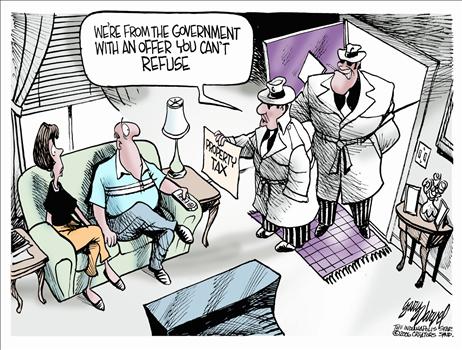
Contest winner can't afford to live in new house - Disabled auditor won the requirement to pay over $19,000 per year in property taxes.
No Change in IRS Interest Rates for the Fourth Quarter of 2006 - The main one most of us deal with will remain at 8.0%. I've updated this info on my Quick Reference page.
Internet new wrinkle in swampland scam – While using the internet to research and focus in on potential real estate investments is an efficient way to handle that part, to actually buy property without physically inspecting it is the height of stupidity. Buying lottery tickets makes more sense than that.
Lesser Known Credentials
Q:
Subject: ATPKerry:Does ATP refer to Air Transport Pilot?And what is ATA?
A:
ATA = Accredited Tax Advisor
ATP = Accredited Tax Preparer
You can see full details on these at www.acatcredentials.org/credentials.html
Kerry Kerstetter
Microsoft QuickBooks?
As has been quite obvious, I am a huge fan of the QuickBooks programs and try to pass along any tips and useful guides that I come across. I was a little concerned about the reliability of this CD-ROM self study course because both the email that I received advertising it and the table of contents that you can click on from their website have the following picture:

For anyone unclear on why this would concern me, while Microsoft did attempt to purchase Intuit 15 or so years ago, that was shot down by the Feds on anti-trust grounds and QuickBooks has always been produced by Intuit, a company completely unrelated to Bill Gates' behemoth. I wonder about what else isn't accurate in a course about QuickBooks if they can't even keep this basic fact straight.
Labels: QB
Carryover Cost Basis
Q:
Subject: 1031 Cost Basis vs. Actual Price - Accounting QuestionDear Guru:I would appreciate ANY help you could spare! My question is this:My corproation bought "Vacant Lot A" in 2003 for $5,000.00. In 2005 my corporation sold "Vacant Lot A" for $40,000.00, using a 1031 Exchange. With the 1031 Exchange proceeds, my corporation bought another investment property, "Vacant Lot B" for $40,000.00. What is the "book value" I should show as my corporation's asset for "Vacant Lot B"? Would it be the cost basis of $5,000.00 or the actual purchase price of $40,000.00??
I don't know who else to ask! I would greatly appreciate you pointing me in the right direction!
A:
If you've ever read any of my blog postings, you should already know in what direction I will be pointing you; into the arms of a professional tax advisor. It is crazy and downright irresponsible for you to attempt to operate a corporation without the appropriate guidance of trained professionals. I'm assuming that you are the 100% owner of this corp because any co-owners could bring an action (lawsuit) against you for fiscal malfeasance if you have been risking their investment without proper professional support services.
The terminology in your email also raises some concerns about the validity of your 1031 exchange. To be valid, your corp should not have actually received any of the proceeds form the first property, but had them held by a neutral third party exchange facilitator. Hopefully, you had an exchange facilitator and didn't try to handle the 1031 sale and reinvestment on your own, in which case, there would have been a taxable sale.
Assuming there was a valid 1031 exchange via an appropriate facilitator, there is a tax form (8824) that needs to be attached to your corporate tax return documenting the details of the 1031 exchange. Part of that form includes a calculation of the cost basis of the new replacement property. This calculation takes into account the cash given, the cash received, the debt assumed or paid off on the old property, the debt assumed on the new property, as well as the adjusted cost basis of the old property.
Using simplistic numbers and assuming that you essentially swapped one property for another that was worth $40,000, the adjusted basis of the replacement property on the corp books will be the exact same basis as the old property. In this case, that means it would be $5,000. A 1031 like kind exchange is technically a tax deferred exchange. This means that if you were to sell (not exchange) the new replacement property for $40,000, the gain from the original property would pop up and be taxable.
This is a very basic principle which any competent professional tax advisor should have no problem explaining to you.
Good luck. I hope this helps.
Kerry Kerstetter
Labels: 1031
What could go wrong?
IRS sends collection agencies calling for back taxes
The three official sub-contractors:
The IRS chose three firms for the initial cases: The CBE Group of Waterloo, Iowa; Pioneer Credit Recovery of Arcade, N.Y.; and Linebarger Goggan Blair & Sampson, an Austin, Texas, law firm.
Who knows how many other free-lancers will jump in and try to scam money out of taxpayers.
What do the three official subs earn for this?
The profit potential is large. The collection companies will keep up to 24% of what they recover. That amounts to as much as $336 million of the $1.4 billion the IRS projects the program will recover during the next decade.
Bewitching

I guess a case could be made for a similar deduction in this country if the appropriate qualifications were met, such as you were already a witch before taking the classes and not just starting out in that profession.
News From WebCPA
Whatever happened to tax reform? – This perpetual political promise is no closer to reality than it’s ever been. In fact, as always, we are continuing to move in the complete opposite direction, guaranteeing an increasing and never-ending workload for those of us in the tax profession.
GAO: Reforming the tax system will close tax gap – Duh!
Finding a safe pair of hands – Succession planning for the continuation of small businesses is often overlooked.
TIGTA: IRS must work on high-income return audits – For obvious reasons, the higher your AGI, the larger the bullseye on your back.
QuickBooks and Write-Up: Shifting Roles – It seems so counter-productive to have clients use QB for their bookkeeping and then CPAs use a completely different program to prepare financial statements, when everyone could very easily use the same QB files.
IRS fraudulent refunds an estimated $318M – Oops! Does this now mean that we can expect a typical over-reaction from IRS, similar to their audits of all amended returns claiming refunds because they screwed up and allowed $50 million in bogus slave tax credits a few years ago?
Jewelry Sale
Q:
Subject: RE: Interesting tax questionThanks Kerry for the valuable information and points well taken.To clarify, I didn't assume the sale of a personal ring to be a business transaction, I didn't miss it per se. I do have a difference of opinion on this being a business transaction but totally understand how the IRS will see it differently. Regarding the sales tax, if the IRS says it's a business sale, then can't I substantiate a lower sales price, less the sales tax? Creating a legitimate business sale of $9,150 price, plus tax of $850, increasing taxable income (and SE tax) by $150 and a tax payable to the BOE of $850?Another scenario would be as a capital gain of $1,000 at the collectible tax rate of 28%.Also, good advice, I did actually incorporate at the end of 2004. I keep my books totally separate. I really like quicken for the portfolio tools, I don't think QuickBooks offers these tools. I also have a CPA, but like to do some research so I understand my own taxes. My CPA gave me the same scenario you did, that it would be a business transaction since I am in the jewelry business.My other argument to this is that the ring I sold is considered "used" and I don't sell used jewelry, I sell made to order custom jewelry. A pawn shop on the other hand sells "used" and "estate" jewelry.Anyhow I am just assessing all the angles. I find it interesting.I appreciate your input and will let you know how it all turns out.Sincerely,
A:
The only way you could possibly make a case that the ring sale was not part of your regular jewelry business might be if it was sold to someone who wasn't a normal "customer," such as a family member. You didn't mention who you sold the ring to. If it was somebody who patronizes your business and is not related to you, there is no way you will be able to convince IRS not to added it to your Sch. C. Being used won't make any difference.
As you know, sales taxes are assessed on the ultimate consumer, but collected by the retailer on behalf of the state. If you didn't charge the buyer of this ring, and you end up having to pay the state out of your pocket for the un-collected sales tax, you will be entitled to a deduction for that in the year in which you make the payment if you are on the cash basis of accounting. If you are using the accrual basis, you could make a case for accruing that expense for the year of the sale. In that case, the auditor will need to see proof that you subsequently paid it.
If you didn't prepare a bill of sale or other receipt showing that the $10,000 was to include sales tax, you are going to have a hard time convincing the BOE that it was a sale for $9,150. BOE auditors are notoriously harder to deal with than are IRS auditors in their relentless thirst for money.
You are correct that QuickBooks doesn't have the market price adjusting utilities that Quicken has for stocks; but that entire process in Quicken is not proper accounting and end up giving distorted cash basis financial statements. That was one of the biggest complaints I had from clients who I wanted to switch, but they've adjusted just fine to QB, and we have much more accurate accounting reports.
Good luck.
Kerry Kerstetter
Gifting Strategies
Q:
Subject: question on gift taxesI found your website very helpful. I have a question though.
My partner and I will be buying a home within the next 4-6 months. A life time friend has offered to contribute $150,000 to us both. Could he give 12k to each of us in Dec and another 12k in Jan (no taxes) and then can he loan us the balance? Would this be a way around the taxes?
Thank you for your time and I hope you don't mind the question.
Best,
A:
A combination of gifting and loans with future principal forgiveness is a common technique to avoid gift tax returns.
Your wealthy friend needs to consult with his professional tax and legal advisors to set up the actual details of how this would work since the gift tax reporting is his responsibility.
You and your partner would receive gifts free of any income tax; but you should still discuss any possible consequences of this plan with your own professional tax advisors.
Good luck.
Kerry Kerstetter






















